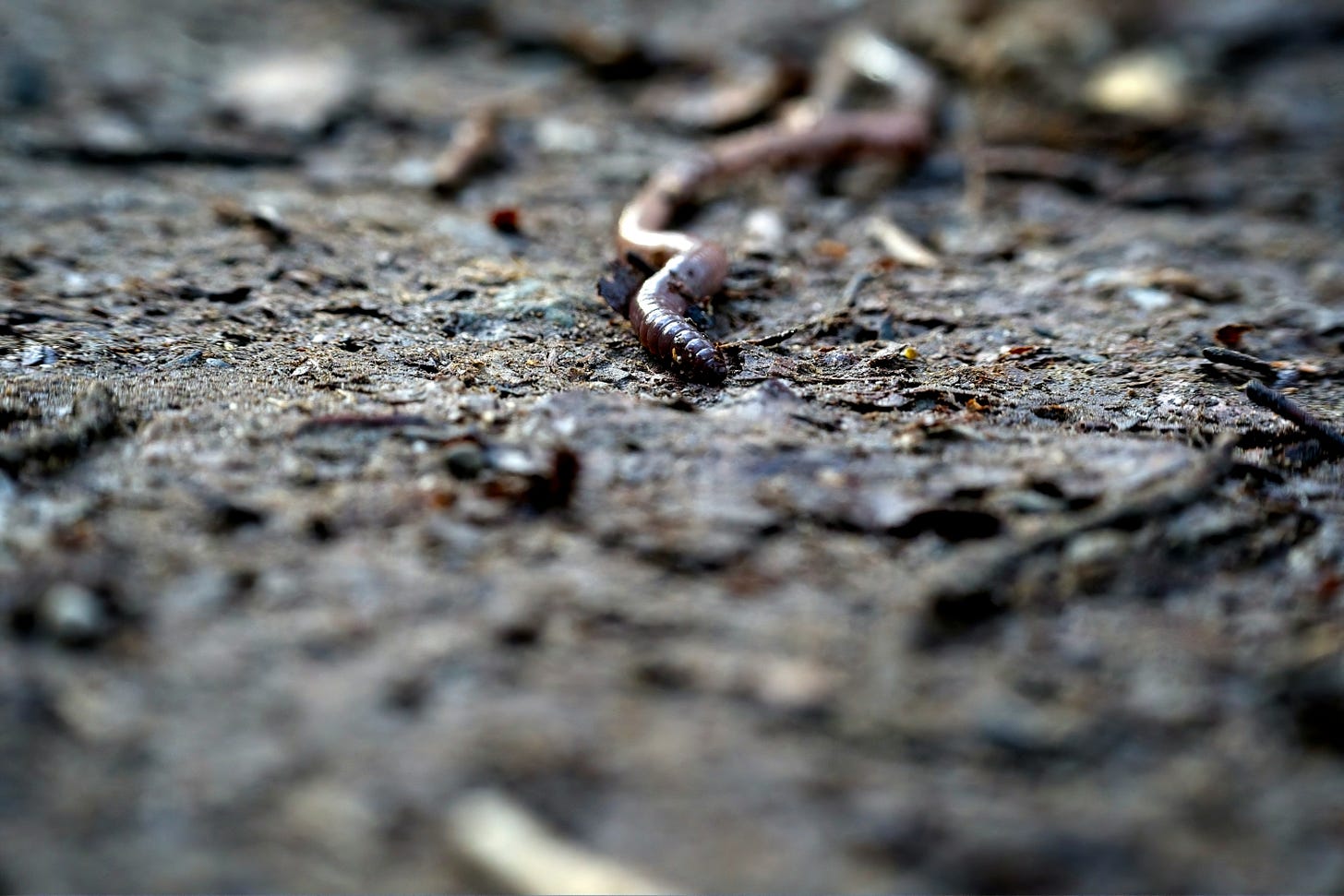In a world that often champions speed, complexity, and the next big thing, there’s something quietly remarkable about creatures like earthworms. Yes, I mean the actual squishy pink thing that wriggles out onto sidewalks after a good drenching of rain. The very same animal that gives many people the “ick,” I find quite humble. Unassuming beings, really. They rarely grab the spotlight - unless you’re a scientist dedicated to studying them, but I’ve never met an earthworm scientist though I am sure they exist - but their slow and steady work is essential to life on Earth.
If you’re anything like me, you grew up marvelling at the big, flashy animals — the leaping sharks, mysterious wolves, majestic jaguars, beautiful hawks. But as I’ve spent more time studying nature, both in professional and personal capacities, I’ve come to appreciate that some of the most critical players in our ecosystems are not the show-stoppers. They’re the backstage crew, dressed in all-black (or this case pink?) to blend into the background, quietly ensuring that everything runs smoothly.
Earthworms may not look like much, but they’re engineers of our soil. You know, the very substance that makes life on their planet flourish? (Kind of important!) These wriggly creatures tirelessly burrow through the earth, creating tunnels that aerate the ground and allow water to seep in. Their movements bring life to the soil, mixing organic matter and recycling nutrients. Without them, the rich, fertile land we rely on to grow our food would be a very different — and far less productive — place.
Think about that for a moment. Every onion, every loaf of bread, every apple we enjoy owes a debt of gratitude to the slimy earthworm. It’s a reminder that small, slow actions can have monumental impacts. And that you don’t have to be complex to be powerful! In an era dominated by flashy technology and rapid innovation, there’s a tendency to overlook the simple and the slow. Earthworms are nature’s testament to the power of consistency; sometimes the most effective solutions are the ones that work quietly in the background, without fanfare.
We often feel pressured to do more, achieve more, be more. Social media bombards us with content, much of it designed to grab our attention in an instant and hold it for only a moment longer. We’re encouraged to multitask, to optimize every minute, to pack our schedules full. In this hectic rush, it’s easy to forget the beauty of simplicity. But life doesn’t always have to move at breakneck speed to be meaningful! There’s value in slowing down, in focusing on the basics — like being kind, working steadily toward our goals, and nurturing the communities around us. Earthworms take their time, moving at their own pace, and still manage to create a foundation upon which so much of the natural world depends.
Is it just me, or does simplicity seem like something we as a society are craving more and more? Every friend I talk to is interested in doing less, instead opting for intentional steps towards a meaningful life (whatever their/your definition of that is). Personally, I want to honor the slow, the steady, and the simple. Because in the grand scheme of things, these are the forces that sustain us.
Perhaps, as we all settle down to just breathe in the midst of notifications and alarm bells going off, the earthworm is a critter that we can look to as an example. No, I don’t mean roll around in the dirt of your backyard. Or, maybe I do if that brings you joy.
As I write this, a massive thunderstorm is quickly making its way towards us. I love a good summer storm; the lightning lighting up the night sky, the inky clouds blotting out the stars, and the smell of rain permeating the air. Whenever we had a big storm in Florida, all the worms would come wriggling out from the grass onto the sidewalk. Many would inevitably die when the sun came out, quickly drying up the concrete and turning the watery oasis into a frying pan of death. If I wasn’t busy, I was that weird girl who would try to rescue the few who were still holding onto life amongst the many that had already perished.
I hadn’t thought about them back then the way I do now - tiny reminders that you don’t need to be loud or fast to make a difference. Today, I relish knowing that slow and simple are exactly what the world needs most.




